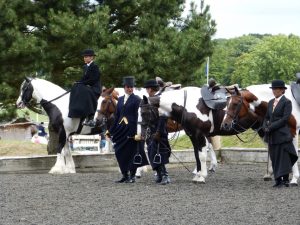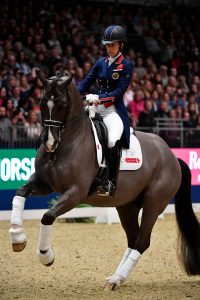We horsey folk live in a funny old world, writes CAROLYN HENDERSON. Sometimes, it seems like an alternative universe. While everyone else has been pounding keyboards over Brexit, sections of the horse world have been getting hot under the collar over dressage riders wearing brightly coloured boots and show horses sporting the wrong browbands. The latter might sound like a Wallace and Gromit film, but feelings run high.  Adult side-saddle riders usually wear silk hats or bowlers when showing. Image: Carolyn Henderson.[/caption] It all comes down to tradition. In some cases, there are acceptable reasons behind mysterious rules – for instance, chunky show cobs wearing brightly coloured, ribbon-bedecked browbands look like elephants wearing tutus, whilst plain leather bridles with broad nosebands and browbands complement their workmanlike looks. I’ve been writing about horses long enough to remember the days when wearing the wrong boots in the show ring was the equivalent to riding in your PJs. I’ve passed on professional show riders’ tips about having garter straps sewn to the tops of your boots and counting the number of plaits your horse should sport. For the record, garter straps go back to the days when breeches were made from non-stretch fabric. They were designed to help keep your boots up, and your breeches legs down. And while we’re playing Trivial Pursuit, tradition dictates that there should be an odd number of plaits down the horse’s neck, plus one for the forelock. Perfectionists always aimed for nine, but although gurus now advise putting in as many plaits as suit your horse’s conformation, the style police won’t arrest you if you have the “wrong” number. As new enthusiasts from non-horsey background entered the equestrian world, many traditions were questioned or ignored. Dressage riders started it with blinged-up browbands, and when Charlotte Dujardin admitted that she “loved a bit of bling” the rest of us felt no guilt about releasing our inner divas. Some traditions were made to be broken, and I’m glad they’ve gone. After dandy brushes at dawn on social media pages, showing riders accepted that in most cases, they had to wear hats with three-point safety harnesses. [caption id="attachment_20072" align="alignright" width="200"]
Adult side-saddle riders usually wear silk hats or bowlers when showing. Image: Carolyn Henderson.[/caption] It all comes down to tradition. In some cases, there are acceptable reasons behind mysterious rules – for instance, chunky show cobs wearing brightly coloured, ribbon-bedecked browbands look like elephants wearing tutus, whilst plain leather bridles with broad nosebands and browbands complement their workmanlike looks. I’ve been writing about horses long enough to remember the days when wearing the wrong boots in the show ring was the equivalent to riding in your PJs. I’ve passed on professional show riders’ tips about having garter straps sewn to the tops of your boots and counting the number of plaits your horse should sport. For the record, garter straps go back to the days when breeches were made from non-stretch fabric. They were designed to help keep your boots up, and your breeches legs down. And while we’re playing Trivial Pursuit, tradition dictates that there should be an odd number of plaits down the horse’s neck, plus one for the forelock. Perfectionists always aimed for nine, but although gurus now advise putting in as many plaits as suit your horse’s conformation, the style police won’t arrest you if you have the “wrong” number. As new enthusiasts from non-horsey background entered the equestrian world, many traditions were questioned or ignored. Dressage riders started it with blinged-up browbands, and when Charlotte Dujardin admitted that she “loved a bit of bling” the rest of us felt no guilt about releasing our inner divas. Some traditions were made to be broken, and I’m glad they’ve gone. After dandy brushes at dawn on social media pages, showing riders accepted that in most cases, they had to wear hats with three-point safety harnesses. [caption id="attachment_20072" align="alignright" width="200"] Charlotte Dujardin chooses a safety hat. Image: Kit Houghton.[/caption] Common sense prevails in dressage and eventing, too. Even riders who are permitted to wear top hats often choose to wear stylish safety helmets instead. That includes the lovely Charlotte Dujardin, who sets trends as well as breaks records. I wouldn’t wear bright blue boots in the dressage arena, but I can’t find a sensible reason why anyone who wants to should be permitted from doing so. The 2017 British Dressage members’ handbook makes no stipulation on the colour of riders’ boots, and says: “As long as the core dress rules are adhered to, embellishments and additions to any item of dress are permitted as long as they do not pose a welfare risk to the horse.” So, is tradition best consigned to the dustbin? Not always. At one time, competitors were always polite to judges and officials, even if they went home and moaned about people with failing eyesight. Private moans stayed within a small circle because that, of course, was before social (or anti-social) media had been invented and people didn’t need reminding to engage their brains before they engaged their keyboard fingers. Some traditions are rooted in safety. Riding left hand to left hand when two or more horses are in a school avoids accidents, as does jumping practice fences only from the direction where the red marker is on your right. Yet some riders either don’t know, or don’t care. Traditional values of courtesy and common sense? Yes please. Tradition for its own sake? It’s up to the individual. But whatever side of the fence you choose, please be kind to each other.
Charlotte Dujardin chooses a safety hat. Image: Kit Houghton.[/caption] Common sense prevails in dressage and eventing, too. Even riders who are permitted to wear top hats often choose to wear stylish safety helmets instead. That includes the lovely Charlotte Dujardin, who sets trends as well as breaks records. I wouldn’t wear bright blue boots in the dressage arena, but I can’t find a sensible reason why anyone who wants to should be permitted from doing so. The 2017 British Dressage members’ handbook makes no stipulation on the colour of riders’ boots, and says: “As long as the core dress rules are adhered to, embellishments and additions to any item of dress are permitted as long as they do not pose a welfare risk to the horse.” So, is tradition best consigned to the dustbin? Not always. At one time, competitors were always polite to judges and officials, even if they went home and moaned about people with failing eyesight. Private moans stayed within a small circle because that, of course, was before social (or anti-social) media had been invented and people didn’t need reminding to engage their brains before they engaged their keyboard fingers. Some traditions are rooted in safety. Riding left hand to left hand when two or more horses are in a school avoids accidents, as does jumping practice fences only from the direction where the red marker is on your right. Yet some riders either don’t know, or don’t care. Traditional values of courtesy and common sense? Yes please. Tradition for its own sake? It’s up to the individual. But whatever side of the fence you choose, please be kind to each other.
I cookie ci aiutano a offrire i nostri servizi. Utilizzando i nostri servizi, acconsentite al nostro utilizzo dei cookie.











